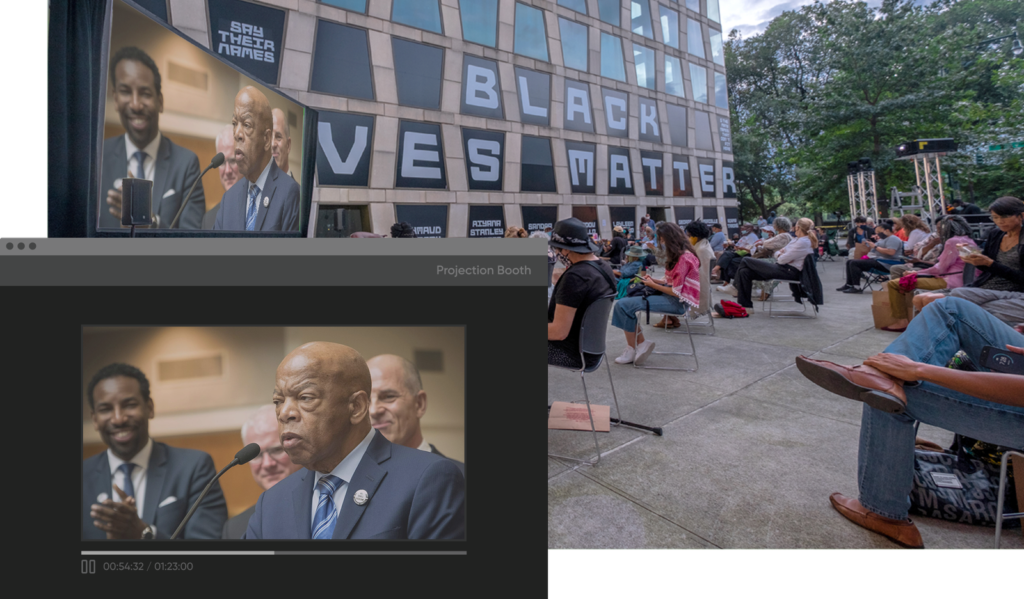This week on the Boxoffice Podcast, co-hosts Daniel Loria, Rebecca Pahle, and Shawn Robbins look to the past—i.e., last weekend’s better-than-expected debut of Free Guy, released exclusively to theaters by Disney—and to the future, with box office analysis of upcoming theatrical releases as well as discussion about the 2021 edition of CinemaCon, kicking off August 22. In this week’s feature interview, Pahle interviews Christie Marchese, founder of social cinema app Kinema—designed to unite filmmakers and hosts to bring films cinema to areas lacking an art house cinema. Excerpts from that interview are below; for more information, visit Kinema.com or listen to the full episode.
Subscribe to The Boxoffice Podcast on Spotify, Apple, or wherever you get your podcasts.

Could you describe for our listeners what Kinema is and the impetus behind the platform? The word “disruption” is used too often, but it does appear to be a twist on the traditional exhibition ecosystem.
I’ll give you the the top line. We say at Kinema, we give everyone their own movie theater to support the filmmaking that they want to see. It’s our mission to make it fun and easy, as well as financially and socially rewarding, for anyone, anywhere to host screenings. We built an operating system, essentially, for filmmakers to manage their own, non-theatrical exhibition—a.k.a. screening tours or community screenings or grassroots tours, however you want to call them—both online and offline. It’s two parts. It’s the tech, but it’s also supporting filmmakers and developing partnerships and relationships with screening hosts, so they can help reach audiences everywhere. So it’s part marketplace, tech platform, curating films, and giving them the technology to run their tours, and part building out that network of screening hosts so that we can have a wider footprint for every film release.
You’ve been able to host virtual screenings for a while now and in-person screenings for a much shorter period of time, due to Covid. What sort of films are screened through Kinema?
The initial films we started with on the platform leaned more social impact and advocacy. And part of that is, that’s what my network is. As we started building and slowly opening up the platform to new filmmakers, we wanted to work with people that we knew already. The second reason is, most of our network of screening hosts does lean more towards advocacy and activism, because they know how to organize. Putting together a screening event or hosting screenings takes a level of event planning or community building. They naturally can do it easily, based on the type of work that they do and the issues they’re interested in.
But, that said, we’re actually looking to work more with individuals and spaces who are becoming regular screening hosts. Meaning not just picking per issue, or something that’s relevant at the time, but using the platform as a source of community building and revenue driving. The way we have it set up is, when you pick a film and you organize a screening, you can either sell tickets or make it free for your audience. If you make it free for your audience, it’s standard, you pay a licensing fee up front. But if you actually are selling tickets, you get a percentage. And the intention there is to incentivize people to actually bring in money for the filmmaker and themselves. Looking at our data, we find the screenings where you sell tickets perform better. People are more committed to show up. They bring in a little bit higher revenue. With that, we’re going to be working with a wider range of films. Based on a few contracts we have now, in the next couple of weeks of our database will be changing. We’ll be about 54% documentary and 46% narrative. Maybe 25% will be comedies. So it really is important for us to have a diverse range of genres and types of films to meet the needs of the different exhibitors and screening hosts that we have.
What’s your infrastructure for delivering these films?
Right now a we’re just calling it like our projection booth. So you, as the filmmaker, upload the film and assets just one time. And then any of our hosts can go in. If they choose that film, they set their screening date and time, and they get access to local server space online where they can download the film safely and securely, but it disappears after the time of their screening. So through their Kinema account, they’ll get access to that film in that limited window. They can do test screenings, and there’ll be a big watermark on it. And again, it disappears after their screening. On our end, we can then monitor each of those hosts and how many times they’re accessing that film to make sure it’s just for the time in which they paid for.
Subscribe to The Boxoffice Podcast on Spotify, Apple, or wherever you get your podcasts.



Share this post